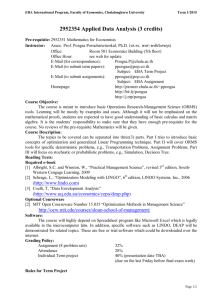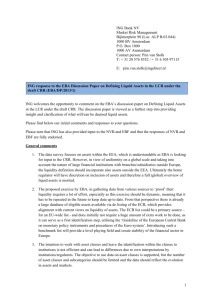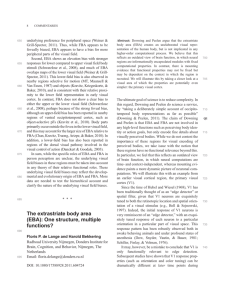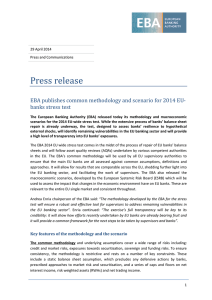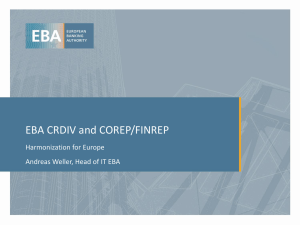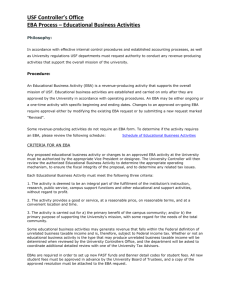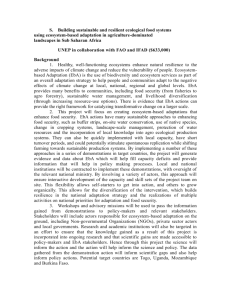Teys Australia - Productivity Commission
advertisement
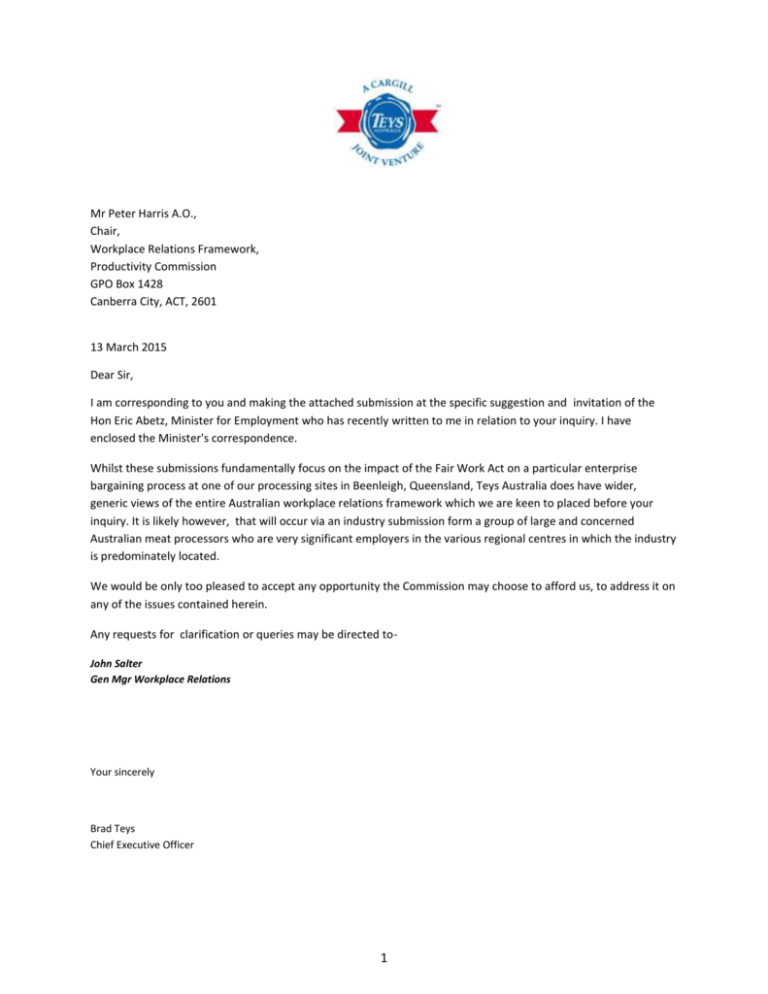
Mr Peter Harris A.O., Chair, Workplace Relations Framework, Productivity Commission GPO Box 1428 Canberra City, ACT, 2601 13 March 2015 Dear Sir, I am corresponding to you and making the attached submission at the specific suggestion and invitation of the Hon Eric Abetz, Minister for Employment who has recently written to me in relation to your inquiry. I have enclosed the Minister's correspondence. Whilst these submissions fundamentally focus on the impact of the Fair Work Act on a particular enterprise bargaining process at one of our processing sites in Beenleigh, Queensland, Teys Australia does have wider, generic views of the entire Australian workplace relations framework which we are keen to placed before your inquiry. It is likely however, that will occur via an industry submission form a group of large and concerned Australian meat processors who are very significant employers in the various regional centres in which the industry is predominately located. We would be only too pleased to accept any opportunity the Commission may choose to afford us, to address it on any of the issues contained herein. Any requests for clarification or queries may be directed toJohn Salter Gen Mgr Workplace Relations Your sincerely Brad Teys Chief Executive Officer 1 EXECUTIVE SUMMARY INTRODUCTION This submission is compiled and submitted on behalf of Teys Australia , providing a practical, real world example of the operation of the Fair Work Act 2009 . Teys Aust is Australia's second largest beef processor and exporter, employing close on 4,500 people with an annual turnover approaching $ Aus 3 billion. It operates in Queensland , Vic, NSW and S.A. and is the largest employer in the various regional centres in which it has a presence, with an annual payroll in excess of $Aus 350 million, people costs representing 62% of its operating expenses . Teys is a party to twenty-one (21) FWC approved Enterprise Agreements, which cover production and repair and maintenance wages employees at its nine geographically dispersed operational sites. THE SUBMISSION The submission focuses on a real life, long running dispute Teys continues to endure with the Australasian Meat Industry Union over a ground breaking agreement Teys reached with its production employees at its Beenleigh Queensland site in 2013. The approval of that agreement has been mired in litigious complexity which in Teys view, the Fair Work Act has exacerbated , rather than neutralised. The agreement remains intact , albeit tenuously, being the subject of a temporary interlocutory stay of FWC Full Bench orders , pending further hearings before the Federal Court on 6 May 2015 and , as a consequence of this most disappointing chain of events, there are potentially negative ramifications for the Beenleigh operation and its employees, including• For the majority of employees, the 2013 EA provides them with increased wages than what would have been paid to them if they completed the same work under the 2010 EA. The 2013 EBA also provides employees with enhanced Long Service Leave entitlements, better minimum rates of pay and improved entitlements if absent due to workplace injury or illness and an annual profit share bonus which in 13/14 averaged $4,800. • At the time Teys Australia was renegotiating the 2010 EA, we had identified significant inflexibilities associated with the application of the predecessor 2007 EA (particularly associated with the piece rate system) which was threatening the viability of the Beenleigh operation. The 2013 EA allows for increased productivity, and the facility will need to again reassess its financial viability if forced to revert to the 2010 EA. At the least there is likely to be an immediate redundancy of approximately 45 positions. • The Teys Board is due to commit $20 million dollars in capital investment in the Beenleigh plant during the 2014/2015 financial year. This investment will eventually lead to further job creation at Beenleigh. The investment will not be made if the 2010 EBA is revived. • There will be substantial difficulties in adjusting the CHRIS payroll system on a retro basis to accommodate the 2010 EBA at a predicted cost of approx $500,000. THE AREAS OF IMPACT- FAIR WORK ACT 2009 This entire experience has exposed significant flaws in the Workplace Relations system, particularly in the areas of the process of reaching agreements and having them approved , and the inability of the Act to limit bargaining to issues pertaining directly and only to the employment relationship, and the default status of Unions as bargaining reps, and the challenges in terminating expired agreements. The table on page 8 illustrates this and proposes sensible solutions. CONTACTS Any PC, media, Government or other inquiries regarding this submission may be directed toJohn Salter Gen Mgr Workplace Relations 2 SUBMISSION ON BEHALF OF TEYS AUSTRALIA GROUP OF COMPANIES The Teys Group 1. Teys Aust is Australia's second largest beef processor and exporter, employing close on 5,000 people with an annual turnover approaching $ Aus 2 billion. It operates in Queensland , Vic, NSW and S.A. and is the largest employer in the various regional centres in which it has a presence, with an annual payroll in excess of $Aus 350 million, people costs representing 62% of its operating expenses . 2. Teys is a party to twenty-one (21) FWC approved Enterprise Agreements, which cover production and repair and maintenance wages employees at its nine geographically dispersed operational sites- see www. teysaust.com.au Teys Australia Beenleigh 3. Teys Aust's Beenleigh , Qld site is located within the Logan City Council area in an industrial corridor just west of the Pacific Highway, approximately half way between the Brisbane CBD and the Gold Coast. It operates on a two shift basis Monday to Friday, however there are employees working on the site 24/7. Whilst employment figures fluctuate, it takes approximately 850 employees per 24 hour period to meet its production schedule. 4. Since 1997, production related employment has been governed by a series of federally regulated workplace/ enterprise agreements, the last of which was finalised in 2010, being approved by Commissioner Spencer of the then FWA on 22 December 2009 ( AE 872935) – “the 2010 EBA” 5. That 2010 EBA applied as follows1.3 Coverage &Scope- This Agreement shall apply to all Employees employed by Teys Bros (Beenleigh) Pty Ltd who are engaged in stock receival and preparation, production, and cleaning operations at the Beenleigh plant whose work is covered by the classifications contained in this agreement. It applies to all such production Employees, both existing and future and applies to them whether they are members of the Union or not. This Agreement does not seek to, nor does it cover, Employees engaged in repair and maintenance, administrative and clerical, laboratory, first aid,managerial or supervisory work. 6. As has historically been the case in the Queensland export meat processing sector, the 2010 EBA contained prescriptive piecework provisions which applied to approximately 30% of the production workforce, namely, the skilled classifications of Boner, Slicer and Slaughterer. Although modified over the years by successive agreement negotiations, these piecework provisions are nonetheless largely relics of old Federal Award tally systems which were removed via the Award simplification process embarked upon by FWC in the late 1990's. 7. These provisions remunerated the skilled employees via the weight or number of raw material inputs they processed, prescribed strict staffing ratios and created caps on productivity per skilled employee, beyond which work stopped or prohibitive penalty rates applied, often well within the expiration of the ordinary hours of work. Whilst debate continues, removal of these piecework provisions and remuneration of skilled employees at hourly rates of pay, as opposed to piecework earnings, is arguably the single largest factor in the continuing litigation within FWC of replacement of the 2010 EBA with the 2013 EBA. Background to the 2013 EBA 8. Negotiations for a replacement to the 2010 EBA for production related employees at Beenleigh began in November 2012 and, as has traditionally been the case, were held with paid officials of the Australasian Meat Industry Employees Union (AMIEU) and elected employee representatives of the various production departments and shifts operating on the plant. Some five separate meetings occurred up to 19 December 2012, when the plant was due to cease production which was (at that time) the annual scheduled four week maintenance shut down of the site. 9. In all, the following were dates upon which negotiations took place2nd November 2012, 14th November 2012, 12th December 2012, 17th December 2012, 19th December 2012, 21st January 2013, 18 th February 2013, 27th February 2013, 18th March 2013, 15 April 2013, 19 April 2013, 6 May 2013, 13 May 2013, 27 May 2013, 11 June 2013, 20 June 2013, 1 July 2013- with Cmr Riordan of FWC in Brisbane, 2 July 2013- with Cmr Riordan of FWC in Beenleigh, 8 July 2013, 9 July 2013, 2 July 2013- with Cmr Riordan of FWC in Brisbane, 18 July 2013, 29 July 2013 - with Cmr Riordan of FWC in Brisbane. a total of twenty-three (23) separate dates. The 2012 EBA- February 2013 Ballot (the first ballot) 10. Teys Aust came to a view that bargaining had concluded on 21 January 2013 when the parties agreed that a proposed agreement (the 2012 EBA ) should go to ballot (the first ballot) as all matters were agreed in principle. This was a compromise “roll over” agreement designed to essentially mirror the existing 2010 agreement with only very minor amendments and annual wage increases of 3.5% to all rates of pay and allowances. 12. On 18 February 2013, a meeting was held to ascertain if there were issues of substance or process which needed to be addressed or discussed before voting at the first ballot commenced on 20 February 2013. The employee reps indicated that the ballot should proceed as scheduled , however on 22 February 2013 the first ballot was declared in the negative. This was entirely predictable, because, in the period leading up to the ballot the employee reps and Union had not actively promoted endorsement of 3 it. This negative campaign was due to Teys Aust refusal to commit to a number of Union encouragement details which had complemented previous negotiated settlements via separate deeds of agreements/ exchanges of letters- these Union privileges involved right of entry of officials, payroll deduction facilities of Union dues and Union involvement on new employee preemployment induction programs. The 2013 EBA - August 2013 Ballot (the second ballot) 13. Bargaining for a new agreement resumed in March 2013 and protected industrial action occurred during May 2013. On 9 July 2013, Teys Aust tabled a fifth revised proposal for the 2013 agreement which the committee members and the Union rejected, indicating that they would not support its acceptance. However Union officials indicated that there would be no objection to the company putting its proposal to a ballot of the employees. 14. In days immediately following that meeting, Teys Aust was presented with a petition signed by over three hundred employees requesting that approval of the 2013 agreement as proposed by the company be submitted to secret ballot. On 18 July 2013 a resumed meeting with the EBA bargaining committee and AMIEU officials was convened where the existence of the employee petition was revealed and the committee and Union asked to reconsider its previously stated position to oppose acceptance of the proposed 2013 EBA. 15. Upon resumption of that meeting, the Employee reps on the committee and the Union reaffirmed its opposition to the 2013 agreement, the Qld Branch Secretary, Mr Brian Crawford firmly indicated that the AMIEU would “never sign the agreement in its current form”. Management representatives then indicated that Teys Australia would comply with the views of most of its employees and place the proposed new agreement to a secret ballot of employees (the second ballot). 16. Aside from the involvement of the Australian Electoral Commission and some additional employee education measures undertaken in the second ballot, the ballot process undertaken by Teys Aust in 2013 was no different to those adopted since 1997. It involved identification of all production based employees who, at a given date which was more than seven (7) clear days prior to the commencement of the second ballot, were included on the weekly payroll contained within the Teys Aust automated CHRIS payroll/ HR system. The only employees to be excluded from the list of weekly paid employees are those whose conditions of employment are covered by the repair and maintenance EBA which exists separately. All employees (apart from the maintenance employees) are included on a roll of eligible voters. 17. The ballot was held on 1 and 2 August 2013 and declared in the affirmative by the AEC on 5 August 2013 . The majority was small, but decisive, and was achieved despite a determined campaign against approval by the AMIEU. It is clear that several hundred union members voted to approve the agreement against the advice of their union and in doing so, the employees, by majority, accepted that job security was an important issue for them, so they made the hard decision necessary to secure that security. 18. The 2013 EBA represented a breakthrough in industrial conditions in the industry, providing for a modern and sustainable wages platform necessary for the Beenleigh operation to survive. Without change of this kind, the Beenleigh operation was unlikely to be sustainable and was at risk of closure. These issues were discussed honestly and transparently with employees and with the AMIEU throughout the process, however the AMIEU does not accept this reality. 19. Despite the positive vote and the clearly explained potential consequences for the site and the workforce if the EBA failed, the AMIEU opposed the approval of the EBA by the Fair Work Commission on a number of grounds. The primary attack was based on an assertion that certain Teys Australia employees (predominantly trainee supervisors) were not entitled to vote for the proposed EBA. Approximately twenty-one (21) employees were identified by the AMIEU as 'ineligible'. 20. Until the AMIEU filed its objection to the Beenleigh EBA lodged for approval in August 2013, Teys Aust had never received any complaint from the AMIEU about people in trainee supervisor roles being allowed to vote to approve an enterprise agreement. It is certain that the AMIEU was aware of many previous occasions when trainee supervisors had voted for and been covered by similar enterprise agreements at this and other Teys Australia sites. This fact was supported by sworn, uncontested evidence in the FWC approval hearings. 21. In relation to the trainee supervisors, the facts are: (a) These employees are not engaged as supervisors. They remain engaged in their substantive classification, which are plainly covered by the proposed enterprise agreement (and all of its predecessors). (b) All of them carry out work which is within the phrase in clause 1.3 of the proposed agreement 'stock receival and preparation, production and cleaning preparations at the Beenleigh Plant whose work is covered by the classifications contained in this agreement'. (c) In the course of that training, they do 'on the job' supervisory training. However all of this is under staff supervision, and they do not have traditional supervisor accountability to give formal directions or to initiate or administer disciplinary processes. They participate in these tasks, but under supervision. (d) The employees have been selected as having potential to eventually be appointed to a supervisor role (which is a salaried staff appointment with a different employing entity). They are therefore placed on a training program designed to assist them to gain the skills and qualities required to be appointed to a staff supervisor role. (e) The training offered to trainee supervisors is no different in principle to the training offered to other employees who wish to move from one classification to another within the enterprise agreements. Until they are formally appointed to the higher classification, they remain in their substantive role. 4 (f) Trainee supervisors could be directed at any time to carry out any amount of production work while participating in the program. This commonly occurs on a daily or weekly basis for most trainees. They could also be removed from the program at any time. (g) Trainee supervisors are, and have always been, paid in accordance with the appropriate classification under the Production Enterprise Agreement. The protections of the enterprise agreement are of considerable value to the trainee supervisors, and they would be highly concerned if they were removed. (h)The Trainee Supervisors have always regarded themselves as bound by the Enterprise Agreement and several of them gave evidence accordingly. (i) During the hearing, even the union witnesses (all workplace delegates) themselves gave evidence that they also believed the Trainee Supervisors were covered by the Enterprise Agreement. 22. On 27 September 2013, Deputy President Asbury approved the 2013 EBA, issuing written reasons on 4 October 2013 [2013] FWC 7804 It is obvious from the reasons that the DP found that the disputed employees (and particularly the Trainee Supervisors) were covered by the EBA and therefore entitled to vote. 23. The 2013 EBA came into operation on 4 October 2013 and the Beenleigh Plant has operated in accordance with the new EBA, which is vastly different to any of the previous enterprise agreements applying at the plant. Employees have worked in accordance with the new arrangements since that time and have been paid accordingly. The First FWC Full Bench Appeal 24. The AMIEU filed an appeal against the decision of D P Asbury on 11 October 2013 and the main ground of appeal was that the DP erred in finding that the Trainee Supervisors were eligible to vote on the EBA. 25. A hearing before a Full Bench of the Fair Work Commission took place on 11 December 2013 and on 4 March 2014, it issued a decision in the appeal – [2014] FWCFB1313 In summary, the Full Bench found that D P Asbury erred in her interpretation of the term 'will be covered' in s.181(1) and s.182(1) of the Fair Work Act and also erroneously had regard 'to what would be a fair or sensible outcome in determining the coverage of the Agreement'. It was seven (7) pages long and took twelve (12) weeks to be issued. 26. It did not make a finding that the EBA was not capable of being validly approved, but determined that DP Asbury had applied the wrong test when approving it. The decision did not suggest that DP Asbury would not have approved the EBA if she had applied the correct test, and referred it back to her for further consideration. In hindsight, the decision to refer the matter back to the DP condemned the 2013 EBA to become mired in a morass of litigious complexity and conflict. 27. The orders reflecting the Full Bench decision became contentious and litigious. The Full Bench invited the parties to make submissions as to whether the original decision should be quashed ab initio (essentially an order to the effect that it never existed at all) or prospectively from the date of the order. A formal hearing relative to this became necessary and was conducted before DP Gooley on 24 March 2014. The orders were issued on 25 March 2014 PR548952. and applied prospectively from that date. This gave rise to significant confusion and further litigation. The Second 2013 EBA approval 28. DP Asbury relisted the approval of the 2013 agreement for hearing on 9 April 2014 and it was bitterly contested. On 10 April 2014 she issued another decision again approving the EBA [2014] FWC 2449 , with effect prospectively from 17 April 2014. This resulted in a significant period of "limbo" being established where no one could determine what actually applied during the period 4 October 2013 until 16 April 2014. 29. On 24 April 2014, the AMIEU lodged another appeal against the 10 April 2014 decision of DP Asbury to approve the 2013 EBA. The Second FWC Full Bench Appeal 30. On 5 June 2014 another appeal Full Bench comprising SDP Acton (Presiding) DP Richards and Commissioner Simpson heard the AMIEU appeal against the second EBA approval decision of DP Asbury and the decision was reserved. 31. On 25 September 2014 the second FWC Full Bench (by majority) (Acton, Richards and Simpson) found that the trainee supervisors were not within the scope of the Enterprise Agreement, and should not have voted. The majority decision of the Full Bench also found that the other employees on temporary assignment should not have voted. That finding was to the effect that eligibility to vote must be assessed purely by reference to what the employees are doing at the precise time they cast a vote. The Full Bench majority found that employees who are temporarily seconded away from production roles and into temporary roles not referred to in the classification structure of the Enterprise Agreement could not vote, even if they would shortly (and in some cases inarguably ) return to roles which were covered by the Enterprise Agreement. However the Bench also said they would consider approving the agreement with employer undertakings. [2014] FWCFB 5643 32. On 12 October 2014 Teys applied an across the board 3% increase to wage rates and paid out the final instalments of the 2013/2014 profit share bonus to eligible employees. The total profit share pool was approx $2.5 mil and the median bonus figure was $4,800. 5 33. On 27 November 2014 the second FWC Full Bench conducted a further hearing to determine whether or not it could accept the proposed undertakings to allow approval of the agreement. On 19 December 2014 the second FWC Full Bench issued another majority decision refusing to accept Teys proposed undertakings.[2014] FWCFB 8589 The First Federal Court proceedings 34. On 8 May 2014, the AMIEU made application seeking orders under s.16 of the Federal Circuit Court Act (Cth.) and s.567 of the Fair Work Act 2009 (Cth.) that Teys Aust was, from 4 October 2014 obliged to observe the terms and conditions of the 2010 EBA. In direct response to this application, Teys Aust appealed the original 4 March 2014 Full Bench decision to quash DP Asbury's original decision to approve the 2013 EBA. 35. On 25 June 2014 Justice Jarratt of the Federal Court joined the AMIEU application for judicial determination and the Teys Aust appeal of the original Full Bench decision and referred it to the full Federal Court. 36. On 24 November 2014 a Full Bench of the Federal Court (Buchanan, J, Kratzmann, J and Logan, J) heard Teys application appealing the first FWC Full Bench decision and an application from the AMIEU for judicial determination that the 2010 EBA applied. The Federal Minister for Employment intervened in these latter proceedings and made submissions which did not support the position of either of the parties. The proceedings did not conclude on this day and were finalised by written submissions on 24 December 2014. 37. On 12 February 2015 the full Federal Court handed down its judgment [2015] FCFA 11 on the Teys appeal against the first FWC Full Bench decision to overturn the first approval of the EBA and the Union's application for judicial determination. The Court decided thatTeys Aust application is dismissed on the basis that although the Ross Full Bench incorrectly found error in Asbury's decision (and should not have overturned it) that was an error "within jurisdiction" – eg an error it was "entitled to make". The effect of the Gooley decision is that the 2013 EA never came into operation, with the consequence that the 2010 EA has operated without interruption since the process began. 38. There were however some telling and remarkable comments in the majority judgment as followsExtract from judgment of Buchanan J Deputy President Asbury was not exercising a discretion when she approved the 2013 Agreement; she was intending to obey a statutory command. If the persons who were eligible to vote (including the 2l disputed employees, amongst whom were the 17 Trainee Supervisors) were persons who "will be covered by" the 2013 Agreement then Deputy President Asbury was obliged to approve the 2013 Agreement. In my respectful view, when it examined Deputy President Asbury's reasons, the Full Bench did not pay sufficient regard to the overall context to what would "likely" happen during the life of the 2013 Agreement. This appears to me to be plainly observations about the particular individuals then carryíng out the disputed roles. I doubt that those observations truly merit their description by the Full Bench as "anteriorly derived notions of what would be fair or sensible". That analysis seems to me, with respect, to be one which led directly to the conclusion that the disputed employees were eligible to vote. I do not share the view of the Full Bench that the analysis was based on any apparent error of construction or other legal error. If it was a matter for this Court to decide, I would not agree with the Full Bench that Deputy President Asbury's reasons displayed any misunderstanding or misapplication of the requirements or operation of the FW Act. Extract from judgment of Kratzmann J The second error, it will be recalled, was said to appear in para 50 of Asbury DP's reasons where she said: To accept the argument of the AMIEU with respect to the disputed employees would result in a situation where those employees would not be entitted to the benefits of either the Agreement or the Award, Such an outcome would be neither fair nor sensible. The Full Bench considered that this was erroneous because "anteriorly derived notions of what would be fair or sensible are irrelevant to the task of construing the Agreement", referring to the oft-cited remarks of Madgwick J in ("Kucks"). I doubt very much, however, whether Asbury DP was importing any anteriorly derived notion of what would be fair or sensible. It is well accepted that it is open to the Commission when construing an industrial instrument to settle on a meaning that is open from the text and context which will avoid injustice or inconvenience. The Second Federal Court proceedings 39. On 24 December 2014 Teys appealed to the Federal Court, the second FWC Full Bench to overturn the second approval of the 2013 EBA. On 20 February 2015 Justice Buchanan granted Teys a temporary interlocutory stay of the Acton Full Bench orders [2015] FCA 109 quashing the second approval of the agreement and pending the full hearing of the appeal which has been listed for hearing on 6 May 2015 in Brisbane . The Present 40. The 2013 EBA continues to operate successfully , albeit somewhat tenuously . There are enormous potential ramifications for the industry, Teys, its Beenleigh operations and all the employees (1,000) who derive their livelihood from employment there. Those consequences include• For the majority of employees, the 2013 EA provides them with increased wages than what would have been paid to them if they completed the same work under the 2010 EA. As such, if Teys Australia is ultimately required to comply with the 2010 EA, many employees will revert to inferior wage rates. The 2013 EBA also provides employees with enhanced Long Service Leave entitlements, better minimum rates of pay and improved entitlements if absent due to workplace injury or illness. 6 • At the time Teys Australia was renegotiating the 2010 EA, we had identified significant inflexibilities associated with the application of the predecessor 2007 EA (particularly associated with the piece rate system) which was threatening the viability of the Beenleigh operation. The Beenleigh operation has a number of operational and cost based challenges which other operations (both within the Teys Australia group and those of our competitors) do not face. These include matters such as the cost of environmental compliance in circumstances where the Plant geographically lies in a heavily populated corridor between Brisbane and the Gold Coast , in close proximity to the town of Beenleigh within the Logan City Council local government area. • The 2013 EA allowed for increased productivity, inclusive of increased supply of product, at the Plant. The facility will need to again reassess the financial viability of the current production levels if forced to revert to the 2010 EA. A reduction in throughput will probably occur based on the terms and conditions held in the 2010 EA which could result in a loss of jobs plant wide. Changes which are being actively considered for implementation following consultation with our employees, include reducing to approximately 1,200 head of cattle per day may result in the Boning Room and Load-out Departments and changing to a five (5) by eight (8) hour roster from the current four (4) by nine and a half (9.5) roster. • A five (5) by eight (8) roster could result in employee redundancies of up to 20% (approximately 40 permanent daily hire employees) across Load-out and Boning Room Departments. The cleaning shift may also result in three or four (3 or 4) redundancies and redundancies may also affect salary staff positions, namely a reduction to the management and supervisory team. • The taking of annual leave during the year is not accommodated under the 2010 EA but does feature in the 2013 EA. Should the annual close down resume as it was under the 2010 EA, there is likely to be a reduction in headcount of approximately 5% because those employees were added to staff to accommodate and cover Annual Leave taken throughout the year. Instead, those employees would become surplus to requirements if we were to revert to the 2010 EA. • The Teys Board is due to commit $20 million dollars in capital investment in the Beenleigh plant during the 2014/2015 financial year. This investment will eventually lead to further job creation at Beenleigh. • There will be substantial difficulties in adjusting the CHRIS payroll system on a retro basis to accommodate reversion to payment of skilled workers by per kg or per head. It is anticipated this could cost as much as $500,000. The Areas of Impact- Fair Work Act 2009 41. This entire exercise has exposed significant flaws in the Workplace Relations system, particularly in the areas of the process of reaching agreements and having them approved , and the inability of the act to limit bargaining to issues pertaining directly and only to the employment relationship, and the default status of Unions as bargaining reps, and the challenges in terminating expired agreements. The table in the next page illustrates this and proposes sensible solutions. 7 FWA REFERENCE BRIEF DESCRIPTION OF PROBLEM AGREEMENTS AND BARGAINING - Chapter 2 Part 2-4 Agreement making too complex and cumbersome and there needs to be a range of options available. There should be the capacity for a wide range of agreement types including statutory individual agreements. → EBA's have evolved to the point that they no longer require so much scrutiny. → Unions can derail/ delay bargaining by demanding provisions which do not directly relate to the employment relationship.- → It is too difficult and cumbersome to terminate agreements as the “public interest test” gets in the way. → SUGGESTED SOLUTIONS Types, Content, Status, Approval and Cessation of AgreementsThe system should accommodate Enterprise specific collective agreements, and Single Employer multi-site collective agreements, and Related bodies corporate single and/or multi site collective agreements, and Greenfields collective or individual agreements, and Specific Group and/or individual agreements for employees below the $90k per annum salary threshold. Approval of Agreements Have to be approved and registered , and have to pass an initial broad No Disadvantage Test (not line by line) , and max life of 5 years with finite expiry parties can agree to roll overs in advance of any expiry date with no need to formally reregister, and jointly signed sworn affidavit signifying agreement is sufficient to approve, vary, roll over , extend or terminate - no need for ballots. Contents must only "pertain to the employment relationship" as per Electrolux High Court decision , and unless agreed or decreed otherwise not apply to high income earners, and include an effective grievance procedure, and include details of predicted hours of work which cannot be excessive having regard to the proposed income to be regularly generated , and include relevant rates of pay and a process for periodic review of them. Cessation Agreements can be terminated at any time by joint application, Collective and greenfields agreements automatically terminate 26 weeks after nominal expiry date unless a party obtains an extension Individual or specific group agreements expire at the specified expiry date, unless the necessary steps are taken to roll over or extend them. BargainingEmployers, can only be compelled to bargain for a collective agreement if The default status of bargaining reps can result there is no system of approved formal registered individual agreements already in place , and in agendas being pursued which are extraneous a formal ballot of employees endorses pursuit of a collective agreement by majority. to the interests of the enterprise and its employees. → A Union may be appointed as bargaining rep for any type of agreement only after ANEC approval prior to bargaining and having established it has a current financial membership density of no less than 25% amongst the employees who are intended to be covered by the proposed agreement. 8
